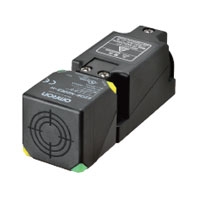| Shielding | Shielded | Unshielded | |
|---|---|---|---|
| Model | E2Q6-N20[]3-H | E2Q6-N30M[]3-H | |
| Sensing distance | 20 mm ±10% | 30 mm ±10% | |
| Set distance | 0 to 16 mm | 0 to 24 mm | |
| Differential travel | 15% max. of sensing distance | ||
| Detectable object | Ferrous metal (The sensing distance decreases with non-ferrous metal. Refer to Engineering Data (Reference Value) on Data Sheet.) | ||
| Standard sensing object | Iron, 60 × 60 × 1 mm | Iron, 90 × 90 × 1 mm | |
| Response frequency *1 | 150 Hz | 100 Hz | |
| Power supply voltage
(operating voltage range) |
10 to 30 VDC, including 10% ripple (p-p) | ||
| Current consumption | 20 mA max. | ||
| Control output | Load current | 200 mA max. | |
| Residual voltage | 2 V max. (at 200 mA load current) | ||
| Indicators | Power indicator (green), detection indicator (yellow) | ||
| Operation mode | NO + NC (Normally open, Normally closed) | ||
| Protection circuits | Power supply reverse polarity protection, output reverse polarity protection, and load short-circuit protection | ||
| Ambient temperature range | Operating and storage: -25 to 70°C (with no icing or condensation) | ||
| Ambient humidity range | Operating and storage: 35% to 95% (with no condensation) | ||
| Temperature influence | ±15% max. of sensing distance at 23°C in the temperature range of -25 to 70°C | ||
| Voltage influence | ±2% max. of sensing distance at 24 VDC in the range of 24 VDC ±15%
±2% max. of sensing distance at 12 VDC in the range of 12 VDC ±15% |
||
| Insulation resistance | 50 MΩ min. (at 500 VDC) between current-carrying parts and case | ||
| Dielectric strength | 1,000 VAC, at 50/60 Hz for 1 min. between current-carrying parts and case | ||
| Vibration resistance (destruction) | 10 to 55 Hz with a 1.5-mm double amplitude in X, Y, and Z directions | ||
| Shock resistance (destruction) | 300 m/s2 3 times each in six directions | ||
| Degree of protection | IEC IP67 *2 | ||
| Connection method | Terminal block | ||
| Weight (packed state/Sensor only) | Approx. 250 g/approx. 230 g | ||
| Materials | Case | Polyamide (PA) | |
| Sensing surface | Polyamide (PA) | ||
| Terminal base | Polyamide (PA) | ||
| Accessories | Instruction manual | ||
